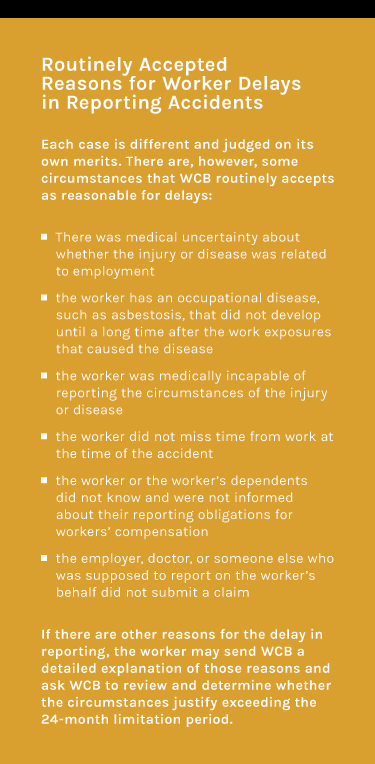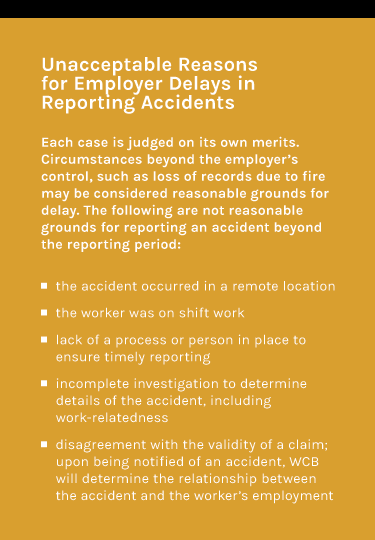Late Reporting: Employer Impact

In a perfect world, work-related accidents should never happen. Unfortunately, we don’t live in a perfect world and workers get injured on the job every day. How work-related injuries are handled can have a significant impact not only on the injured worker but on employers as well.
It is widely accepted that the information obtained closest to any incident is likely the most accurate and work-related accidents are no exception. Prompt accident reporting by workers can result in better medical treatment, faster recovery times and lower claims costs. Delays can impede the claim’s process and are problematic for employers by limiting their ability to:
- validate the accident occurred
- detail the chain of events
- confirm there were no intervening factors or events between the date of accident (DOA) and the date of reporting (DOR) that contributed to the severity of the injury
- investigate the circumstances surrounding a work-related accident from a safety perspective
- meet occupational health and safety (OHS) reporting regulations regarding work-related accidents
- facilitate a safe return to work as quickly as possible

According to the Alberta Workers’ Compensation Board (WCB) Policy 01-05 Part II, App 1, workers are required to report all accidents to their employer when a personal injury is sustained, as soon as practicable. While this seems pretty straightforward, ‘as soon as practicable’ is not always immediately and sometimes involves a significant lag time between when an alleged work-related accident happens and when it is reported to the employer.
Although there are some understandable circumstances for a delay in reporting accidents, it is the incidents that are reported following lay-off notices, seasonal end dates, employee performance reviews and terminations that are particularly frustrating for employers.
Failure by a worker to report an accident to WCB, as soon as practicable, could result in delayed or reduced benefits or the claim being denied. This is tantamount to a slap on the wrist for injured workers, as the instances in WCB significantly reducing benefits or denying a claim are few and far between. Even though there is a 24-month time limit for workers to report a claim, if there are justifiable grounds for the delay or the incident in question is a just claim, the WCB will allow the claim.
On the other hand, employers who file late or incomplete reports or fail to report accidents at all after being a worker has notified them of a work-related incident may be subject to any or all of the following:
- an audit of their accident and claims records and reporting practices
- an administrative penalty investigation of the accident and the costs of the investigation charged to the employer
- disqualification from optional premium pricing, including retroactive disqualification, which may result in premium adjustments and employers having to pay back premium pricing program refunds and in extreme cases, prosecution.
The consequences for employers are substantially more severe than they are for workers and the benefit of doubt falls heavily in  favour of the worker in almost every circumstance. So what is an employer to do to protect themselves against fraudulent late reported claims? Education and documentation.
favour of the worker in almost every circumstance. So what is an employer to do to protect themselves against fraudulent late reported claims? Education and documentation.
- Establishing a written policy on accident reporting is key to ensuring every employee knows what to do when there is a work-related incident, whether it is an accident, injury or even a near-miss. Including this as part of the on-boarding process for every new hire and frequently reviewing the procedure thereafter, keeps the information fresh.
- Reviewing accident reporting expectations following every incident will also help instil the importance of the immediate reporting of incidents.
- Placing posters around the workplace or work site, outlining proper accident reporting makes it easier for incidents to be reported.
- Having workers sign a document that specifically addresses their health and accident record at the time of lay-offs, seasonal end dates, performance reviews or employment terminations can go a long way in shifting the burden of proof to the worker if they try to claim an injury after the fact.
Although there is no foolproof way to prevent the acceptance of fraudulent or questionable claims, taking a proactive approach can be an employer’s best defence. If you would like more information on how late claim reporting affects your organization or if you would like assistance in establishing effective accident reporting policy and documentation, you can contact us directly, during business hours, through our chat feature or by phone at 1-844-377-9545, you can reach us by email at [email protected], [email protected], and you can always connect with us on Facebook, Twitter, or LinkedIn.



